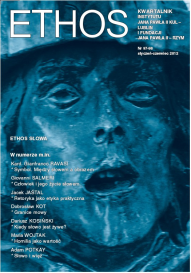Vol. 25 No. 1-2 (2012): THE ETHOS OF THE WORD
Full Issue
FROM THE EDITORS
Articles
23-38
published: 2012-03-30
39-53
published: 2012-03-30
54-72
published: 2012-03-30
73-89
published: 2012-03-30
90-106
published: 2012-03-30
151-173
published: 2012-03-30
174-192
published: 2012-03-30
193-215
published: 2012-03-30
216-242
published: 2012-03-30
243-260
published: 2012-03-30
261-278
published: 2012-03-30
279-291
published: 2012-03-30
292-308
published: 2012-03-30
321-340
published: 2012-03-30
Notes and reviews
Reports
Through the prism of the Ethos
Bibliography of pontifical addresses and documents
413-420
published: 2012-03-30








